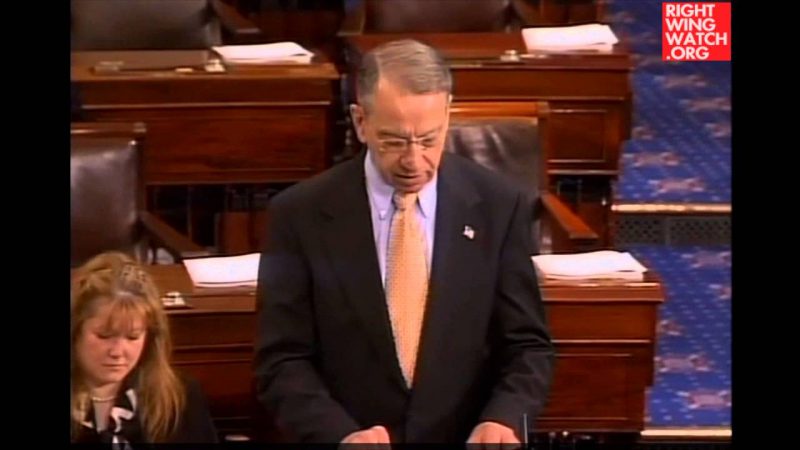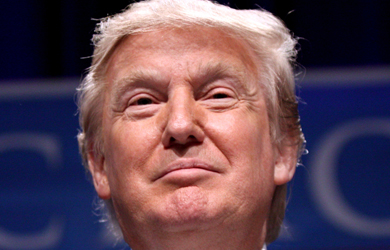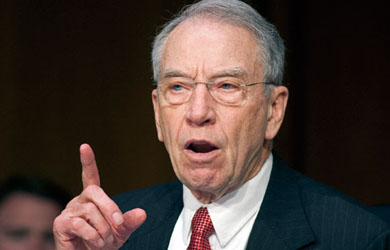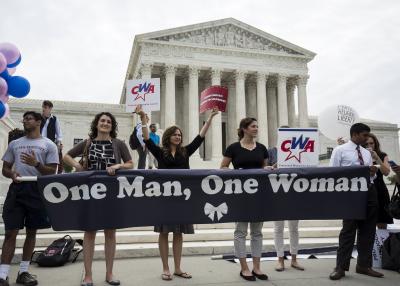Courting Extremism is a weekly feature on conservative responses to the Supreme Court vacancy.
Despite the fact that an overwhelming majority of voters want the Senate to hold hearings on Judge Merrick Garland’s nomination to the Supreme Court, Senate Republicans continue to refuse to even let Garland answer questions.
In doing so, they are taking orders from — and sometimes directly repeating the talking points of — the conservative interest groups that are desperately trying to keep the late Justice Antonin Scalia’s seat open in the hopes that a Republican president will nominate a conservative ideologue to fill it. The Republican Party’s presidential frontrunner has even gone so far as to say that he would outsource the selection of the next justice to these groups.
Here are five ways the GOP has tried to support its Supreme Court blockade this week:
5) The Heller Lie Lives On
Republicans seem to have given up trying to find anything in Garland’s record that might disqualify him serving on the Supreme Court and seem content instead to just repeat blatant falsehoods about his judicial career.
For example, conservative activists have repeatedly claimed that Garland voted to uphold a Washington, D.C., handgun ban when the appeals court he serves on heard an early version of the Heller case. (The Supreme Court eventually used the case to dramatically expand gun rights.)
However, Garland never voted on the case. In fact, he never even heard the case.
Garland only voted to have the case, then known as Parker vs. District of Columbia, reargued in front of the entire Court of Appeals for the D.C. Circuit after a three-judge panel on the court held that the handgun ban was unconstitutional. It is not uncommon for the court to have major cases reargued in front of all of its judges; in fact, one of the court’s most conservative members also voted to have the full court hear the case. However, the vote to rehear the case wasn’t successful, so Garland never ended up ruling on the matter.
But this didn’t stop Virginia Republican Party Chairman John Whitbeck from falsely claiming that Garland did in fact vote in favor of upholding the handgun ban:
“When Justice Antonin Scalia wrote his watershed opinion in D.C. v. Heller, it marked the first time that an individual right to keep and bear arms was recognized by the Supreme Court by a razor thin 5-4 vote,” Whitbeck wrote.
“Now President (Barack) Obama is attempting to replace Justice Scalia with Judge Merrick Garland, an avowed opponent of our Second Amendment rights. While Justice Scalia voted to overturn D.C.’s draconian gun laws, Judge Garland voted to uphold them,” the chairman added, emphasizing the second sentence with bold type.
“It’s simply inaccurate to say Garland’s vote to reconsider the case is tantamount to a vote to uphold D.C.’s gun restriction or to extrapolate from it the nominee’s position on the case,” Warren Fiske of PolitiFact wrote in response to Whitbeck’s anti-Garland appeal. “So we rate Whitbeck’s claim False.”
This falsehood, which is being pushed by the National Rifle Association, the Judicial Crisis Network and other outside groups, is also being repeated by Republican senators attempting to justify their blockade of Garland’s nomination.
Sen. Jerry Moran of Kansas, for instance, cited Garland’s supposed “disregard for Second Amendment rights” when he backed away from his previous support for holding a hearing on the nomination.
4) Family Ties
One of the groups pushing this dishonest smear of Garland has been the Judicial Crisis Network, the organization that was “founded in 2005 as the Judicial Confirmation Network, a pressure group with the goal of confirming President Bush’s federal judicial nominees in his second term in office.”
This group has been at the forefront of the conservative opposition to Garland’s nomination, shaping the movement’s messaging and spending at least $4 million on ads pressuring GOP senators to keep up their blockade.
JCN’s outsized role in the Supreme Court blockade, however, belies the fact that it is a tiny organization funded by an insular dark-money network centered around a single family of conservative operatives.
JCN has relied heavily on funding from a dark-money group called the Wellspring Committee, which is led by Ann Corkery. Coincidentally enough, Corkery’s husband, Neil, serves as the treasurer of JCN. Ann Corkery has also steered more than $1 million from Wellspring to a group called the Catholic Association, another group run by her husband.
Media Matters points out that the Corkery family isn’t the only one benefiting from the connection between JCN and Wellspring: “Michael Casey, who is listed on Wellspring’s 990 financial disclosure forms as its secretary and treasurer, is the son of Republican operative Dan Casey, who is a member of JCN’s board and is reportedly ‘the political and PR brains’ of the organization. Dan Casey is also listed on the Catholic Association Inc.’s 990 financial disclosure forms as its secretary and one of its directors.”
“[I]n 2011, the ties between these two dark money machines grew even closer when Ann Corkery sacked her two fellow board members at Wellspring and replaced them with her daughter and the son of JCN board member Casey, according to IRS filings and former board members,” The Daily Beast notes.
While JCN is the product of a small, well-financed group of right-wing interests, it has, in its effort to shut down the judicial confirmation process, attempted to pose as a group of everyday Americans who just really, really want the Senate to be more obstructionist.
3) Grassley’s Bizarre Speech
One of the most vocal supporters of the GOP’s Supreme Court blockade has been Iowa Sen. Chuck Grassley, who also just so happens to be the chairman of the Senate Judiciary Committee.
In a remarkable speech on the Senate floor on Tuesday, Grassley attempted to justify his refusal to hold hearings on Garland’s nomination by claiming that it is in fact Chief Justice who has politicized the high court … by sometimes ruling in ways that do not advance the GOP’s agenda.
The extremely conservative Roberts, Grassley said, has made the court a political institution because he does not always “vote in a way that advances conservative policy.” As a Republican appointee, Grassley said, the chief justice should have upheld the GOP’s point of view in cases regarding the Affordable Care Act and, by not doing so, has helped politicize the court.
Dahlia Lithwick unpacks the senator’s “ insane logic ”:
Grassley now says that the only way to depoliticize the court would be to appoint nominees who conform their political views to those of the Republican Party. “Justices appointed by Republicans are generally committed to following the law,” he said. And then he argued that the court is too political because Republican nominees don’t act sufficiently politically. “There are justices who frequently vote in a conservative way,” he said. “But some of the justices appointed even by Republicans often don’t vote in a way that advances conservative policy.”
Wait, what? So the problem for Grassley isn’t “political” justices—it’s justices appointed by Republicans who don’t advance “conservative policy” 100 percent of the time. And with that, he revealed his real issue. His Senate floor attack isn’t about depoliticizing the court at all. It’s about calling out Roberts for being insufficiently loyal to the Tea Party agenda when he voted not to strike down Obamacare.
What is really being said here is that there is only one way to interpret the Constitution and that is in the way that “advances conservative policy.” According to Grassley’s thinking, a justice who fails to do that in every single case before him or her is “political” and damaging the court.
Now that Grassley believes that the duty of a Supreme Court justice is to advance the goals of the conservative movement, it shouldn’t come as any surprising that he is refusing to hold hearings on President Obama’s nominee.
This is in clear contrast to what Grassley said before Obama took office, when he insisted that senators should focus solely on a nominee’s qualifications in order to prevent the confirmation of “political hacks” from either side:
… I probably had the same concerns about President Clinton and Justice Breyer and Justice Ginsburg when I voted for them. Regarding the political positions that Justice Ginsburg stood for in her life before coming to be a judge, I wouldn’t agree with many of them. But she was totally qualified to be on the Supreme Court, and I voted for her based upon the proposition that Alexander Hamilton said that the purpose of our activities here of confirming people for the courts is basically two. Maybe there is some historian around who will say Grassley has it all wrong, but I think it was, No. 1, to make sure that people who were not qualified did not get on the courts. In other words, only qualified people get appointed to the courts and that political hacks do not get appointed to the courts.
2) The Grassley Rule, Updated
Given that Grassley is now openly admitting that he only wants to confirm conservative policymakers on the Supreme Court, it should come as no surprise that the he also made it clear this week that the GOP’s blockade of Garland’s nomination is motivated by conservative interest groups with a partisan agenda:
“Conservative groups are very much behind what we’re trying to do,” Grassley said following a town hall event at Northwestern College in Orange City. “They figure that if this president appoints somebody, you’re going to have a lot of negative freedom-of-religion decisions, a lot of negative gun decisions, a lot of negative political-speech decisions. So we want to make sure the court doesn’t veer to the left.”
Once again, the best person to counter Grassley’s argument is Grassley 11 years ago.
Back in 2005, the Iowa senator criticized his Democratic colleagues for supposedly being beholden “to far left pressure groups” in their opposition to a handful of extreme Bush nominees and showing more “loyalty to what is probably their base” than to Americans at large.
1) The Trump Court
The Senate GOP’s effort to prevent President Obama from filling the vacancy on the Supreme Court has always been about its desire to have a Republican president shape the court, even if that means leaving the court short-staffed for a year or longer.
Indeed, these Republicans believe that the next Supreme Court justice should be selected by either Ted Cruz or Donald Trump, a man who doesn’t seem to know how the Supreme Court works.
Both leading Republican presidential candidates have already expressed a desire to see the court overturn — or, in Trump’s words, “unpass” — the landmark Roe v. Wade and Obergefell rulings on abortion rights and marriage equality, respectively. “I’d like to have the person tailored to be just like Justice Scalia,” Trump said.
In a sign of just how powerful conservative pressure groups have become within the GOP, Trump has even said he would effectively let the right-wing Federalist Society and Heritage Foundation pick the next justice.
Among the potential justices that the Heritage Foundation has recommended are Republican Sen. Mike Lee of Utah, who believes that major programs like Social Security and Medicare are unconstitutional, and Bill Pryor, a federal judge who has similarly lambasted New Deal programs and called Roe v. Wade the “worst abomination in the history of constitutional law.”
Such justices would shift the court even farther to the right that it is now, putting the social safety net, environmental regulations and reproductive rights in jeopardy.








